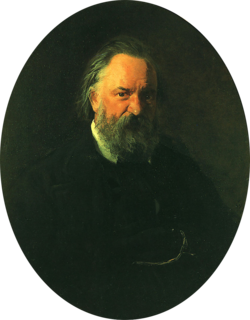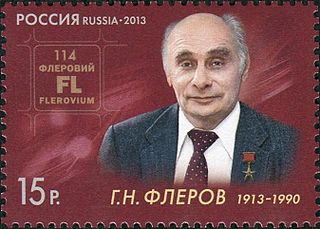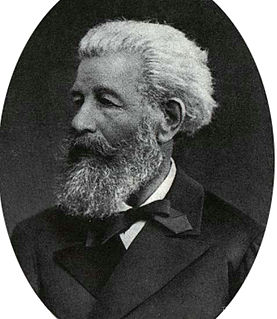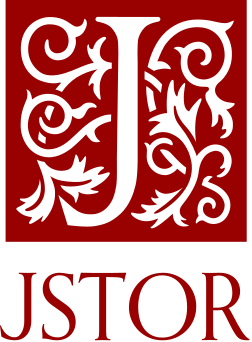
Aleksandr Ivanovich Herzen was a Russian writer and thinker known as the "father of Russian socialism" and one of the main fathers of agrarian populism. With his writings, many composed while exiled in London, he attempted to influence the situation in Russia, contributing to a political climate that led to the emancipation of the serfs in 1861. He published the important social novel Who is to Blame? (1845–46). His autobiography, My Past and Thoughts, is often considered the best specimen of that genre in Russian literature.

Pavel Nikolayevich Yablochkov was a Russian electrical engineer, businessman and the inventor of the Yablochkov candle and the transformer.

The Grand Orient de France (GODF) is the largest of several Masonic organizations in France and is the oldest in Continental Europe. It is generally considered to be the mother lodge of traditional Liberal, or Continental Freemasonry.

Georgy Nikolayevich Flyorov was a Soviet nuclear physicist who is known for his discovery of spontaneous fission and his contribution towards the physics of thermal reactions. In addition, he is also known for his letter directed to Joseph Stalin, during the midst of World War II, to start the atomic bomb project in the Soviet Union.

Boris Nikolayevich Chicherin was a Russian Empire jurist and political philosopher, who worked out a theory that Russia needed a strong, authoritative government to persevere with liberal reforms. By the time of the Russian Revolution, Chicherin was probably the most reputable legal philosopher and historian in Russia.
Vladimir Nikolayevich Toporov was a leading Russian philologist associated with the Tartu-Moscow semiotic school. His wife was Tatyana Elizarenkova.

Paul Tannery was a French mathematician and historian of mathematics. He was the older brother of mathematician Jules Tannery, to whose Notions Mathématiques he contributed an historical chapter. Though Tannery's career was in the tobacco industry, he devoted his evenings and his life to the study of mathematicians and mathematical development.
Continental Freemasonry includes the Masonic lodges, mainly on the continent of Europe, that recognise the Grand Orient de France (GOdF) or belong to CLIPSAS or SIMPA. The majority of Freemasons belong to lodges that recognise the United Grand Lodge of England and do not recognise Continental Freemasons, regarding them as "irregular".

Lev Nikolayevich Korolyov was a Russian / Soviet computer scientist, a corresponding member of the USSR Academy of Sciences. He was involved in the development of the first Soviet computers.

Konstantin Nikolayevich Bestuzhev-Ryumin was one of the most popular Russian historians of the 19th century. He held a chair in Russian History at the University of St. Petersburg (1864–85) and was elected into the Petersburg Academy of Sciences in 1890. In 1878 he founded and gave his name to the Bestuzhev Courses, "the largest and most prominent women's higher education institution in Russia".

Alexey Nikolayevich Olenin was a Russian archaeologist, most notable for being a director of the Imperial Public Library between 1811 and 1843 and the sixth president of the Imperial Academy of Arts between 1817 and 1843.

The Grand Lodge of Russia (GLoR) is the Regular Masonic jurisdiction for Russia. The Grand Lodge was established on 24 June 1995. It was the first national grand lodge to be created in the country since the closure of the original Russian grand lodges in 1822, when Freemasonry was banned.

Andrey Nikolayevich Beketov Russian: Андрей Николаевич Бекетов, 8 December 1825, Penza Governorate, Imperial Russia, — 1 July 1902, Shakhmatovo, Moscow Governorate) was a prominent Russian botanist, an Honourable member of the Saint Petersburg Academy of Sciences.

Alexander Nikolayevich Meller-Zakomelsky was a Russian Governor-General in the Imperial Russian Army and of the Russian Empire.
The Grand Orient of Russia’s Peoples (GOoRP) was an illegal Co-Freemasonry political organisation which existed in Russia from 1912 until 1918. The organisation was highly political in nature and though it included people from several different parties, the most prominent belonged to the Constitutional Democratic Party. Although it originated out of Russian members of the Grand Orient of France, by the time the GOоRP emerged in 1912 it had ripped ties to all foreign masonic organisations. GOoRP had around 400 members.

Alexey Nikolayevich Veselovsky was a Russian literary historian and theorist, critic, biographer and translator.
The Serene Grand Lodge of Greece is a Masonic Grand Lodge in Greece. The name was originally used by an organisation which existed from 1815—1843. After that time the Grand Lodge of Greece took its place. The present organisation under the name of the Serene Grand Lodge of Greece was refounded in 1986 by former members of the Grand Lodge. Today, they are firmly associated with Liberal Freemasonry, belonging to ISMAP and now CLIPSAS.

In computing, a Digital Object Identifier or DOI is a persistent identifier or handle used to uniquely identify objects, standardized by the International Organization for Standardization (ISO). An implementation of the Handle System, DOIs are in wide use mainly to identify academic, professional, and government information, such as journal articles, research reports and data sets, and official publications though they also have been used to identify other types of information resources, such as commercial videos.

JSTOR is a digital library founded in 1995. Originally containing digitized back issues of academic journals, it now also includes books and other primary sources, and current issues of journals. It provides full-text searches of almost 2,000 journals. As of 2013, more than 8,000 institutions in more than 160 countries had access to JSTOR; most access is by subscription, but some of the site's public domain and open access content is available at no cost to anyone. JSTOR's revenue was $86 million in 2015.























